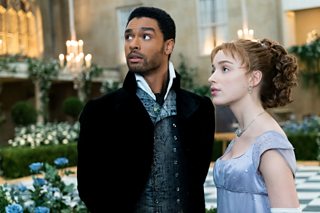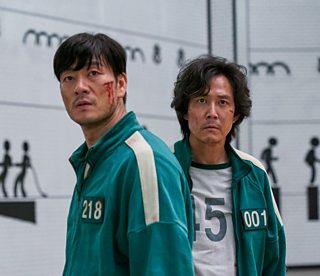Which films and TV inspired Netflix hits Bridgerton and Squid Game?
±«Óãtv Radio 4’s Screenshot explores the expanding universe of the moving image, revealing fascinating links and hidden gems from cinema and TV to streaming and beyond. Presenters Mark Kermode and Ellen E Jones begin with a popular film or TV show and then examine the other productions that have influenced it.
In this episode they look into the history of two of Netflix’s biggest hits. One is Bridgerton, which gives the traditional period drama a modern twist, with a pop music soundtrack, diverse cast and lots of sex. The other is Squid Game, a South Korean thriller about a deadly competition in which desperate contenders risk their lives for the chance to get out of debt.
Bridgerton
The pair find that both shows succeed by adding a new dimension to genres that have been popular for many, many years. Since the first half of the 20th century, adaptations of Jane Austen’s novels have delighted with stories set in the Regency period. Historian Hannah Greig, who served as a historical advisor on Bridgerton, which is also set in the Regency era, says Shonda Rhimes’s show offers something Austen never explored. “Jane Austen always puts her stories in provincial England, in what we might loosely call the middle class,” she says. “Bridgerton is set in the world of the super-rich, the celebrities of the day. The people living in the fast lane who considered themselves to be ultra-modern in Regency times. It captures that sense of it being a modern world for the people living in it.”

Bridgerton is notable for its colour-conscious casting, putting actors of colour in leading roles, and for including orchestrated versions of modern pop hits in its soundtrack. It’s a way of making the world more relatable and a cheeky dismissal of those who think period dramas must exactly replicate the time they’re set in. It’s something that was also seen in Sofia Coppola’s Marie Antoinette, which took a renegade approach to period accuracy, even including a pair of Converse trainers in one shot to show that its characters were not so different from young people today. “There’s no such thing as an accurate period historical drama,” says Greig. “It’s not possible to reconstruct the past in all of its elements. Even those that claim to try to do so aren’t really. We can’t know every possible thing about the past, so we’re always using fictional elements in dramas.”
For its glamour and depiction of people famous for being famous, Ellen compares Bridgerton to Keeping Up with the Kardashians. “It washes over you, in a way that reality television does,” she says. “If you’ve got that in your cultural background, you get Bridgerton a lot more”.

"When you include life and death scenarios, it becomes even more thrilling"
A clip from Screenshot.
Squid Game
As for Squid Game, TV and movie viewers have long had a fascination with stories that pit people against each other, especially when violence is involved. Film writer Anna Bogutskaya tells Ellen, “It’s thrilling to see people compete against one another. It applies to The Great British Bake Off and it applies to Squid Game equally… When you include life and death scenarios it becomes even more thrilling.”

In Squid Game, all the contestants are in severe debt, while the people running the violent competition are ultra-rich. Bogutskaya says there’s a long tradition of this kind of story, which has the upper classes treating the working classes like their playthings. It goes back to The Most Dangerous Game, a 1932 film about “a very rich hunter who, at this point in his life, is so bored, because he can buy everything. He decides to entertain himself by inventing a game where he hunts men.” It’s a theme seen in many popular movies, from Battle Royale, about a group of school children fighting to the death, to Hunger Games, in which poor inhabitants of a dystopian future fight for the entertainment of the wealthy. “All of the death match movies and shows,” says Bogutskaya, “one of the things they have in common is separation of classes, usually due to money.”
Mark boils it down to a very simple truth about entertainment: “Conflict is drama and violence is the physical expression of conflict.” Ultimately, it seems the popularity of Bridgerton and Squid Game is largely down to the fact that audiences, going back centuries, will always love stories about fighting and romance. These two shows found smart ways to repackage those classic themes for modern audiences.
More from ±«Óãtv Radio 4
-
![]()
Screenshot
Ellen and Mark explore the big and small screen precedents for Netflix's biggest shows.
-
![]()
Things Fell Apart
Strange tales from the culture wars by Jon Ronson.
-
![]()
Steelheads
A futuristic thriller starring Jessica Barden as a tennis pro who awakes from cryogenic sleep to find a world in chaos.
-
![]()
Male Order
Why would you look for sperm from strangers on the internet? Read more





